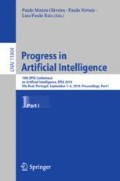Abstract
This paper describes the work developed towards the implementation of a radar-based system for people detection and tracking in indoor environments using machine learning techniques. For such, a series of experiments were carried out in an indoor scenario involving walking people and dummies representative of other moving objects. The applied machine learning methods included a neural network and a random forest classifier. The success rates (accuracies) obtained with both methods using the experimental data sets evidence the high potential of the proposed approach.
Funded by Research Project RETIOT PT2020-03/SAICT/2015 - Fundação para a Ciência e Tecnologia.
Access this chapter
Tax calculation will be finalised at checkout
Purchases are for personal use only
References
Bartsch, A., Fitzek, F., Rasshofer, R.H.: Pedestrian recognition using automotive radar sensors. Adv. Radio Sci. 10, 45–55 (2012)
Berkius, C., Buck, M., Gustafsson, J., Kauppinen, M.: Human Control of Mobile Robots Using Hand Gestures. Bachelor thesis in Electrical Engineering, Chalmers University of Technology. Gothenburg, Sweden. (2018)
Ester, M., Kriegel, H.P., Sander, J., Xu, X.: A density-based algorithm for discovering clusters in large spatial databases with noise. In: Proceedings of the Second International Conference on Knowledge Discovery and Data Mining, KDD 1996, pp. 226–231. AAAI Press (1996)
Heuel, S., Rohling, H.: Pedestrian Recognition Based on 24 GHz Radar Sensors, vol. Ultra-Wideband Radio Technologies for Communications, Localization and Sensor Applications, chap. 10, pp. 241–256. InTech (2013)
Knudde, N., et al.: Indoor Tracking of Multiple Persons With a 77 GHz MIMO FMCW Radar. In: 2017 European Radar Conference (EURAD), pp. 61–64 (2017)
Livshitz, M.: Tracking radar targets with multiple reflection points. https://e2e.ti.com/cfs-file/_key/communityserver-discussions-components-files/1023/Tracking-radar-targets-with-multiple-reflection-points.pdf (2018). Accessed 20 April 2019
Machado, S., Mancheno, S.: Automotive FMCW Radar Development and Verification Methods. Master’s thesis, Department of Computer Science and Engineering. Chalmers University of Technology. University of Gothenburg, Sweden (2018)
Texas-Instruments: People tracking and counting reference design using mmWave radar sensor. ti designs: Tidep-01000 (March 2018)
Yamada, H., Wakamatsu, Y., Sato, K., Yamaguchi, Y.: Indoor Human Detection by Using Quasi-MIMO Doppler Radar. In: 2015 International Workshop on Antenna Technology (iWAT), pp. 35–38 (2015)
Author information
Authors and Affiliations
Corresponding author
Editor information
Editors and Affiliations
Rights and permissions
Copyright information
© 2019 Springer Nature Switzerland AG
About this paper
Cite this paper
Castanheira, J., Curado, F., Tomé, A., Gonçalves, E. (2019). Machine Learning Methods for Radar-Based People Detection and Tracking. In: Moura Oliveira, P., Novais, P., Reis, L. (eds) Progress in Artificial Intelligence. EPIA 2019. Lecture Notes in Computer Science(), vol 11804. Springer, Cham. https://doi.org/10.1007/978-3-030-30241-2_35
Download citation
DOI: https://doi.org/10.1007/978-3-030-30241-2_35
Published:
Publisher Name: Springer, Cham
Print ISBN: 978-3-030-30240-5
Online ISBN: 978-3-030-30241-2
eBook Packages: Computer ScienceComputer Science (R0)

